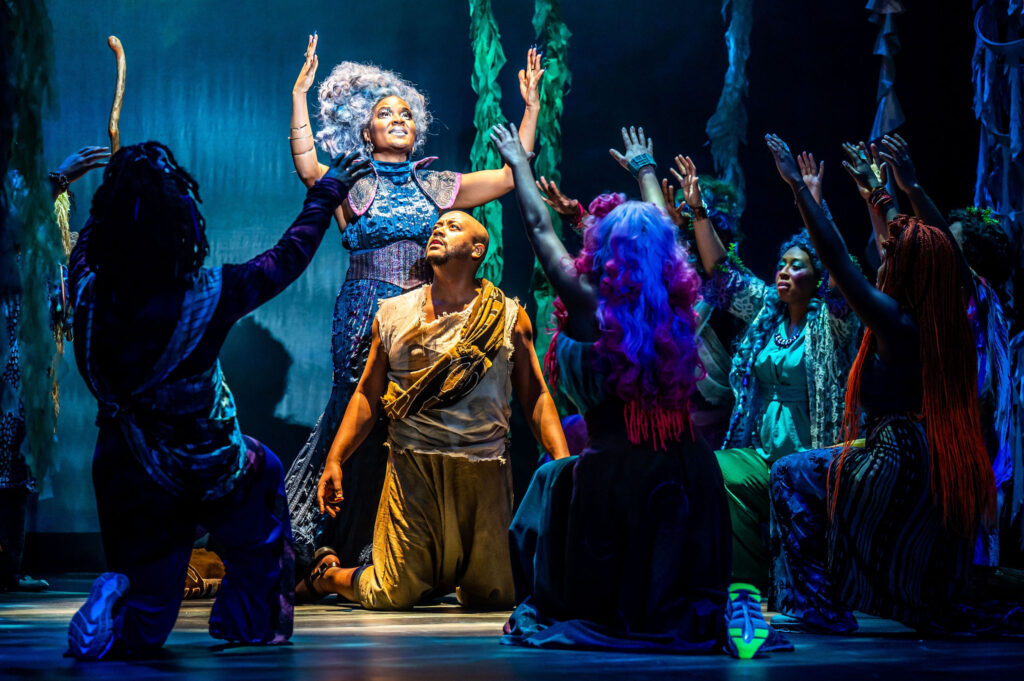The slave ships trail death in their wakes, charting their foul passage across a pitiless ocean. Thousands of Africans pass from the realm of sun and sky, their lifeless bodies descending to the watery Kingdom of Ireti where a sorceress queen awaits to resurrect them to half life. None will ever escape. Yet Maduka will try. His need to breathe deeply, to protect and nurture his infant daughter, cannot be drowned.
“Life on land again!”
A solemn vow.
Life. On land. Again. Compass points in librettist Kanika Ambrose’s dazzling discourse on freedom and rebellion, stark narrative vectors directing us to a point where fable and myth might plausibly reside to the exclusion of reality. But Of the Sea, a radiant new two-act music drama co-produced by Tapestry Opera and Obsidian Theatre, defies the predictable.
This is a sprawling tale of boundless humanity inhabited by scrupulously lifelike characters, their hearts and souls ceaselessly open to scrutiny. United by toxic history, the residents of Queen Dfiza’s abiding seaweed-entangled empire, counterpointed by those of rebellious rival ruler Serwa, Queen of the Enweghi people, drive the story forward, their collective imperishability as palpable as it is eternal.
Originated in 2018 as part of Tapestry Opera’s pioneering LibLab development program, Of the Sea underwent a relatively rapid creative evolution by contemporary opera standards — three years from single discrete scene to fully expanded theatrical form. Partnered by composer Ian Cusson, Ambrose’s crisp, sharply observed narrative tautly affixed to score, the highly charged 90-minute journey to the centre of visionary experience surges with an overwhelming tide of emotion.
Cusson’s music, tirelessly tonal, harmonies and motifs faithfully derived from the formal classical western canon, swells and falls, tumbled and fluid, yielding more than a few vivid examples of evocative sound painting, abundantly evident in the composer’s compelling evocation of the sea. A restless stirring in the violins. Rolling arpeggios. Throbbing chords. A sweeping wash of winds. Notes of Benjamin Britten, perhaps, reminiscent of the Four Sea Interludes. Choruses are expansive, modest singer contingents notwithstanding, in true Romantic style. But it is in the frequent moments of accompanied recits and ariosos that comprise the bulk of Of the Sea’s sonic texture that Cusson’s varied orchestration feels particularly upheld. The tessitura here is singularly lofty with bright flashes of blazing colour demanding daring leaps of passaggio on the part of soloists.
Appearing in the principal role of Maduka, Queen Dfiza’s most recent and, as events quickly prove, most reluctant inhabitant of her undersea dominion, baritone Jorell Williams turns in a performance of enormous energy and virtuosity. “If I must be water, I will not be calm and blue!”, he rages, his voice drenched with fury and frustration. An inexhaustible source of defiance in the face of crushing pressure to surrender his desperate hold on hope. Williams clearly understands the level of jeopardy in play here. An extraordinary characterization.
Singing the opposing roles of queens Dfiza and Serwa, sopranos Suzanne Taffot and Chantale Nurse soar, Taffot surfing wave after wave of cresting high notes, Nurse, a deft middle-voiced navigator, determined and dreamy in equal measure. Ensembles are the exception, by and large, in Of the Sea, but gifted with a sizzling duet in Act II, the pair strike vocal sparks off one another.
Justin Welsh is Izunna, weary friend to Maduka, profoundly touching in an early Act I encounter, his velvety baritone creased with sadness. “I am a roamer, lost ‘till found.”
Tenor Paul Williamson is Yaakaar, a watchman at the towering kelp gates of Dfiza’s kingdom. Soprano Ruthie Nkut is Binyelum, Maduka’s daughter, delivered from the water world by Chukwu, benevolent god of the sun.
Music Director Jennifer Tung leads an impressive 19-player ensemble, overseeing the evening’s proceedings with a masterful blend of gentleness and sensitivity interspersed with moments of forceful command. Cusson’s swirling music is amply well-served by conductor and musicians alike, a goodly number of the latter drawn from the ranks of the Canadian Opera Company Orchestra.
There is much that is real in this production. A ceaseless striving for human liberation. A father’s enduring love for his child.
And much that is magical. Body become spirit become water. A secret hidden world.
Ultimately, however, the two precepts are one. Of the Sea surpasses simple reason. It is self-defining. Like life, it is Of Itself.


